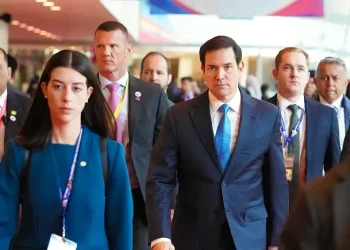A new trade agreement between the United States and the European Union is being hailed as a defining moment for transatlantic commerce.
The deal expands market access, eliminates key non-tariff barriers, and strengthens U.S. leadership across strategic industries including agriculture, aviation, energy, and digital services.
America Secures Landmark Deal with Europe
In a historic win for U.S. trade policy, President Donald Trump’s administration finalized a comprehensive agreement with the European Union this week. The pact promises stronger economic ties, job growth, and improved export conditions for American industries long hampered by EU restrictions.
Backed by a broad coalition of industry leaders, trade economists, and bipartisan officials, the deal is seen as a major advancement in U.S. global economic strategy.
Broad Benefits Across U.S. Sectors
This agreement addresses long-standing trade tensions and creates new pathways for American businesses to expand in Europe. It also reaffirms the mutual commitment to fair trade, innovation, and job creation.
Agriculture Gains Access to New Markets
For American farmers and ranchers, the deal marks a long-anticipated breakthrough. Agricultural leaders are praising the removal of barriers that have limited exports for decades.
“Opening new markets and strengthening existing partnerships will help ensure U.S. farmers continue leading the world,”
said Zippy Duvall, President of the American Farm Bureau Federation.
The agreement covers a wide range of U.S. agricultural products—corn, ethanol, beef, and grain—supporting key rural economies.
Aviation and Aerospace Industries Take Off
Zero-tariff policies for aircraft and aerospace components remain intact, preserving one of the most balanced and lucrative sectors in U.S. trade. Industry associations welcomed the continuation of the zero-for-zero tariff model, which has underpinned the aerospace trade surplus for over 40 years.
“This agreement protects the $104 billion annual U.S. trade surplus in the aerospace industry,”
noted Delta Air Lines.
“It restores a level playing field and secures global competitiveness,”
added Ed Bolen, CEO of the National Business Aviation Association.
Energy, Digital Trade See Clear Gains
Energy and digital commerce are also central to the agreement’s framework. By ensuring regulatory consistency and tariff-free exchanges in digital services, the U.S. reinforces its leadership in next-generation markets.
“This is another example of the Administration’s commitment to American energy dominance,”
said Growth Energy CEO Emily Skor, referring to expanded ethanol exports.
“Digital trade benefits from commitments to avoid customs duties and address regulatory barriers,”
emphasized Victoria Espinel, CEO of the Business Software Alliance.
Cross-Industry Support for the U.S.-EU Deal
| Organization | Statement Summary |
|---|---|
| American Petroleum Institute | Trade deal solidifies U.S. as Europe’s leading energy source |
| Business Software Alliance | Provides stability for transatlantic digital commerce |
| American Iron and Steel Institute | Strengthens U.S. steel industry and supports national economic security |
| U.S. Meat Export Federation | Breaks down non-tariff barriers, improves U.S. meat export access |
| General Aviation Manufacturers Assoc. | Ensures competitiveness and long-term industry stability |
| U.S. Grains Council | Boosts agricultural exports in $1B+ annual market |
Strategic and Economic Implications
The U.S.-EU agreement is more than a diplomatic achievement—it signals a shift in how the U.S. executes economic policy abroad.
By leveraging reciprocal negotiations and tariff strategies, the administration secured a pact that balances American competitiveness with global cooperation.
Notably, the deal:
-
Reinforces U.S. leadership in high-tech, aerospace, and renewable energy sectors
-
Ensures regulatory transparency and predictability across digital trade
-
Eliminates trade barriers that previously blocked millions in agricultural exports
This outcome reflects the broader objectives of the Trump-era trade agenda: restoring balance, protecting U.S. industries, and advancing strategic economic interests without triggering full-scale trade wars.
Reactions from Industry and Policy Voices
The response from U.S. stakeholders has been overwhelmingly positive.
“This is the most significant trade negotiation to date,” said political analyst Ian Bremmer.
“It’s a remarkable success,” added Gerry Baker, Editor-at-Large at The Wall Street Journal.
“This will drive investments and job creation across critical sectors,”
stated Chris Swonger, CEO of the Distilled Spirits Council.
This multi-sectoral support strengthens the credibility of the deal and suggests that future trade negotiations may follow a similar framework.
A Blueprint for Future Trade Deals
The U.S.-EU agreement may become a model for modern trade diplomacy. It combines assertive negotiation with pragmatic resolution, offering lessons for future U.S. policy toward Asia, South America, and other trading blocs.
Moreover, the pact includes mechanisms for ongoing review and future cooperation, particularly in:
-
Harmonizing technology and cybersecurity standards
-
Streamlining environmental and energy regulations
-
Encouraging open markets while addressing unfair subsidies
As transatlantic commerce evolves, this agreement provides the structural certainty many U.S. industries need to scale their international operations confidently.
Final Thoughts
The U.S.-EU trade agreement is a decisive moment in American economic policy. It reflects a shift toward results-focused diplomacy that prioritizes American workers, industries, and innovation.
From agriculture and aerospace to software and ethanol, this deal sets the stage for deeper global partnerships built on mutual strength and stability.
Sources: The White House.
Prepared by Ivan Alexander Golden, Founder of THX News™, an independent news organization delivering timely insights from global official sources. Combines AI-analyzed research with human-edited accuracy and context.









